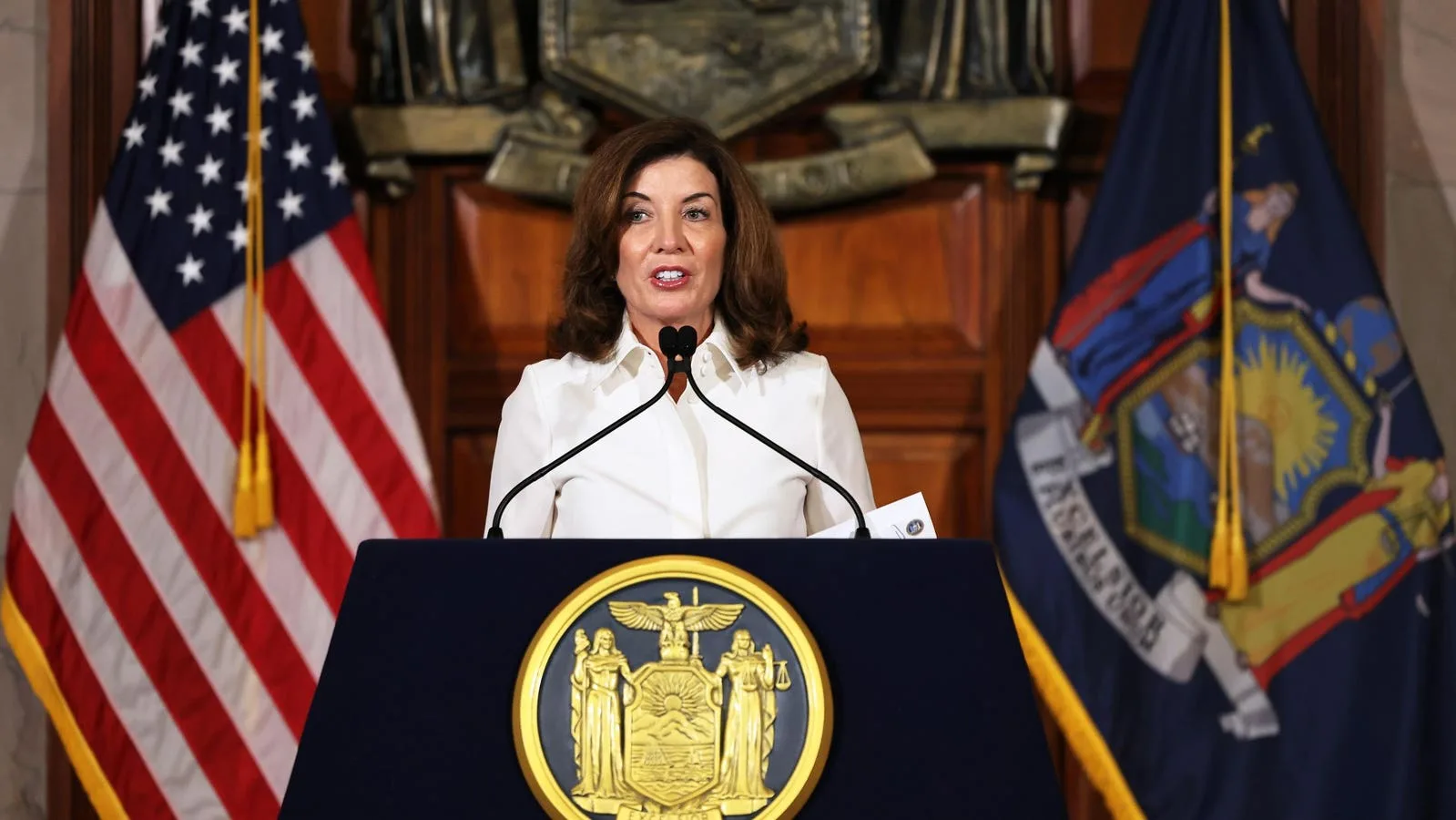
Topline
New York’s Democratic Gov. Kathy Hochul signed a bill into law on Tuesday creating a commission to study the impact of slavery and centuries of racism in the state, and potentially propose reparations, becoming the second state to take action on the issue which has also faced criticism largely from the right.
Key Facts
Hochul signed the bill Tuesday morning, just over six months after both chambers of New York’s state legislature approved the bill, and three years after California Gov. Gavin Newsom (D) signed a law creating a similar task force to study reparations.
The law gives the task force one year to submit a report on findings and recommendations to the state on “appropriate remedies” and the impact of the institution of slavery and the “subsequently de jure and de facto racial and economic discrimination” on Black New Yorkers.
That proposal will be submitted to the state legislature and Hochul, who will decide whether or not to draft a bill based on the task force’s recommendations (Hochul’s term ends in January 2027).
In a press conference, Hochul asked “all New Yorkers to be the patriots and rebuke and not excuse our role in benefitting from the institution of slavery” (slavery was legal in the colony of New York and later in the state of New York until its abolition in 1827, making New York the first state to completely abolish it).
Hochul’s signature comes two weeks after a report by New York City comptroller Brad Lander found decades of school segregation, discriminatory policing, discriminatory housing practices and public health inequities have scarred New York City with the “persistence of a stark racial wealth gap.”
In that report, Lander found the median household net worth of white New York City residents is nearly 15 times higher than that of Black New Yorkers ($276,900 among white New Yorkers compared to $18,870 for Black New Yorkers), while the median household net worth among white high school graduates in the city is nearly three times bigger (at $101,200) than that of Black college graduates with a Bachelor’s degree ($32,000).
New York GOP chair Ed Cox criticized the bill, saying Hochul’s signature on a “divisive and unproductive reparations study is misguided,” arguing the decision reopens “old wounds and stoke[s] racial tensions for political gain.”
Crucial Quote
New York state Sen. James Sanders, who sponsored the bill and chairs the state’s Select Majority Task Force on Minority and Women-Owned Business Enterprises, said in a statement, “This is a day that will be etched in the annals of our state’s history, adding: “Today, we plant a seed of hope, not just for the City of New York and New York State, but for the nation.”
Key Background
Calls for reparations picked up steam amid the Black Lives Matter movement, though proposals date back multiple decades. Federal legislation for a commission to study the possible implementation of reparations was first introduced in 1989, and later reintroduced in 2013, 2015, 2017, 2019, 2021 and 2023 (those bills have either died in committee or were referred to the Congressional Committees of Jurisdiction). Several cities have also launched programs on reparations, including the Chicago suburb of Evanston, Illinois, which created a first-of-its-kind program in 2019 to use marijuana sales taxes to fund reparations. The cities of Boston and St. Louis, as well as Providence, Rhode Island, St. Paul, Minnesota, Berkeley, California, and Asheville, North Carolina, have also proposed reparations projects, including a task force in Boston and St. Louis’ Reparations Commission. In Tulsa, Oklahoma, survivors of the 1921 Tulsa Race Massacre and their families may also receive reparations, after the Oklahoma Supreme Court agreed in August to review an appeal of multiple survivors seeking payment, after they had previously been denied cash payments. A $100 million “Legacy of Slavery” endowment fund established last year at Harvard University, meanwhile, provides funding for students examining the school’s ties to slavery.
Chief Critics
Despite the rise in reparations initiatives, roughly two-thirds of American adults say they’re opposed to cash payments for the descendants of slaves, according to a 2021 poll conducted by WCVB and the University of Massachusetts, Amherst. Roughly 80% of white Americans in a 2022 Pew Research Center poll also said they oppose reparations, compared to 17% of Black Americans. White and Black respondents in the Pew Research poll also had widely different views on whether the legacy of slavery affects Black Americans’ position in society today, with 85% of Black respondents saying it does, and half of white Americans saying so. Right-wing lawmakers have led the chorus of criticism against reparations, arguing America has already paid for racial injustices through Civil Rights laws and welfare programs, with Sen. Tim Scott (R-S.C.)—who is Black—calling himself “living proof that America is the land of opportunity and not a land of oppression.” Senate Minority Leader Mitch McConnell (R-Ky.) also objected to the idea of paying reparations, arguing in 2019 that “none of us currently living are responsible” for slavery.
Surprising Fact
Several prominent colonial era New York residents owned slaves at one point in their life, according to state records. Those slave owners included Alexander Hamilton, the first ever Secretary of the Treasury, and John Jay, one of the authors of the Federalist Papers.
Sfurther Reading
Tulsa Race Massacre Survivors Could See Reparations After Judge’s Ruling—Joining These Similar Cases (Forbes)
California Assembly Passes Reparations Bill (Forbes)



